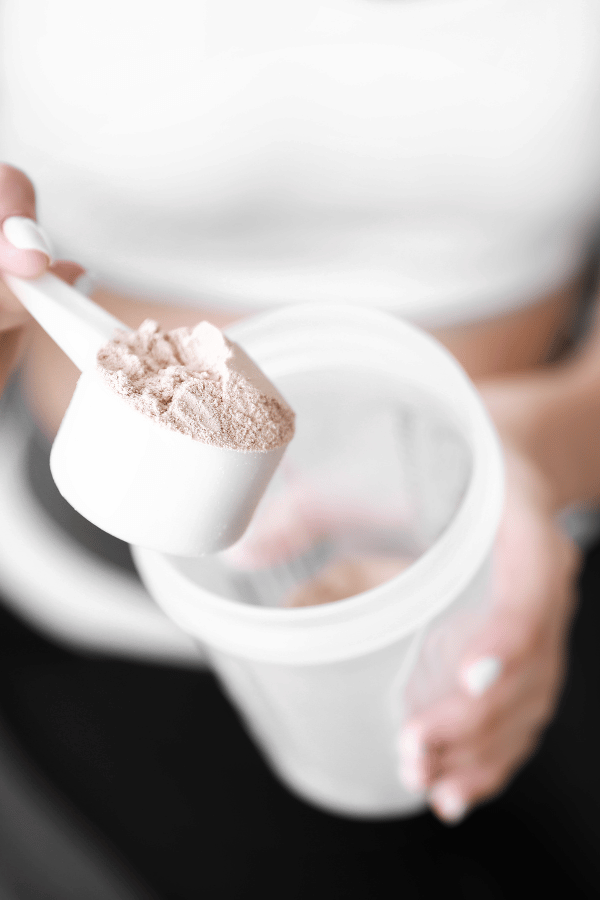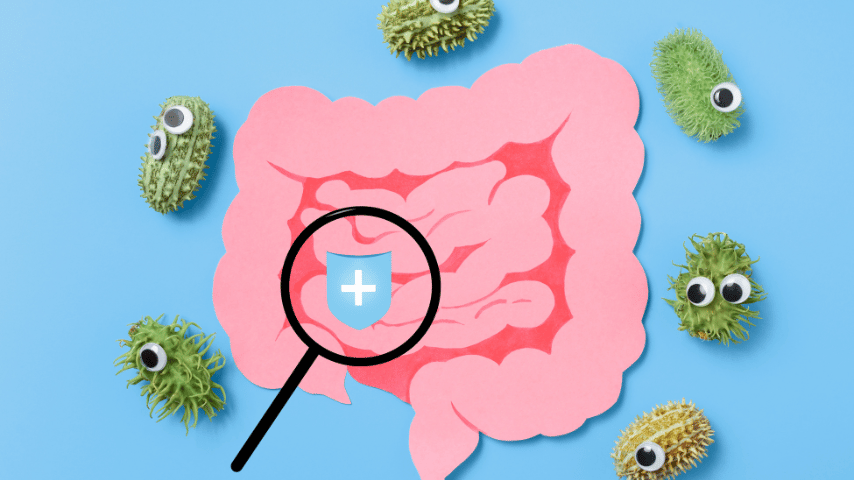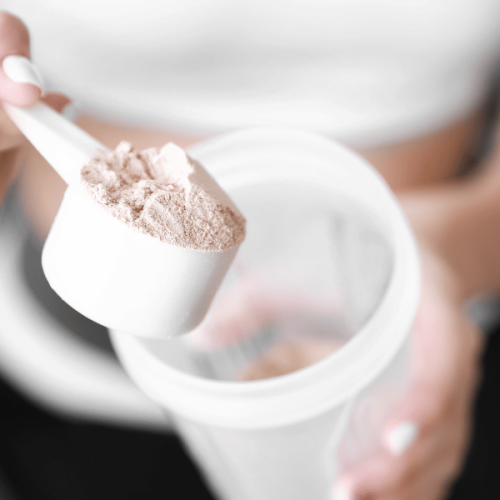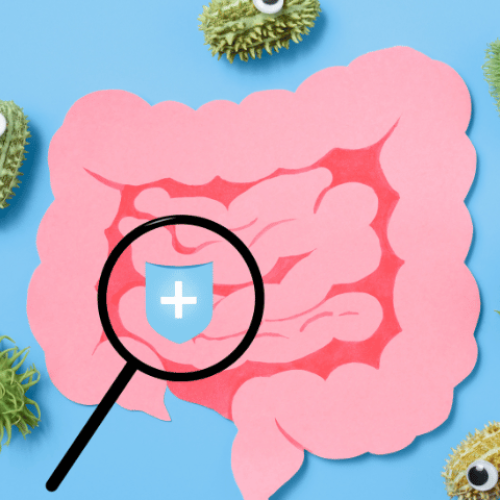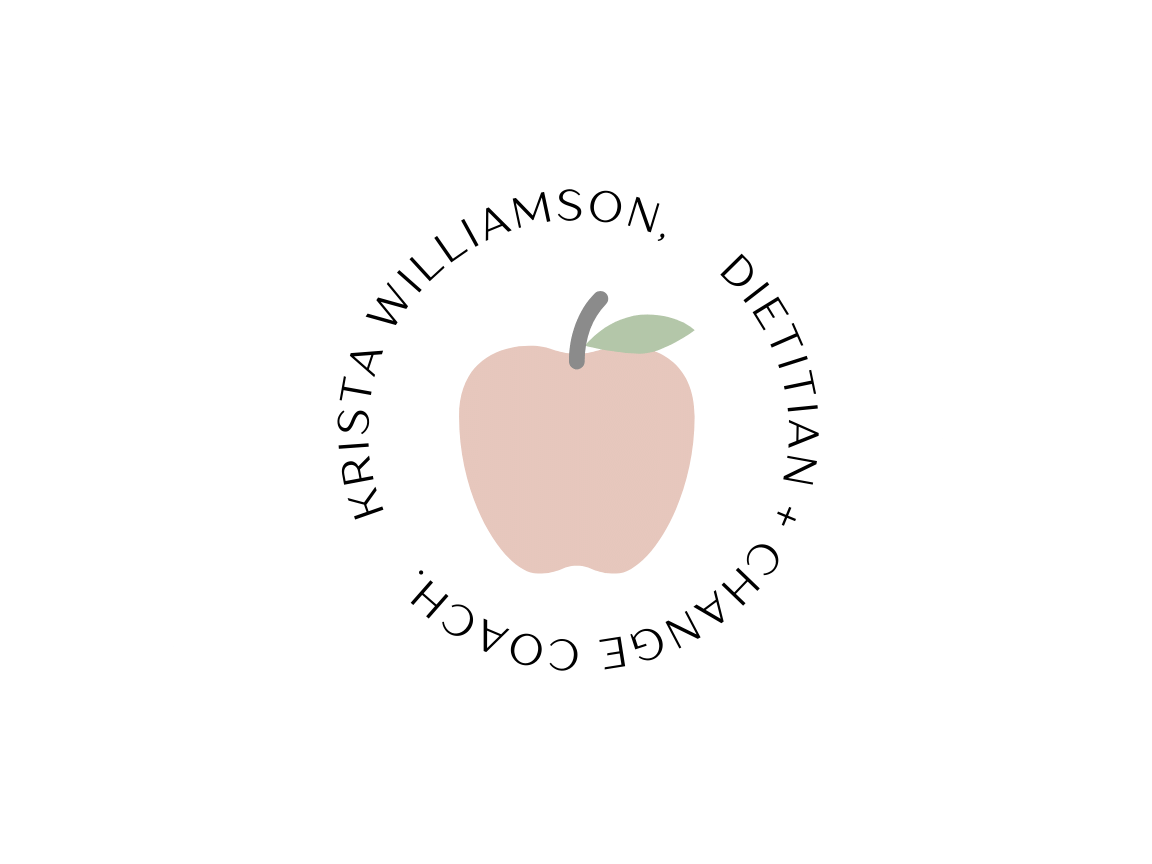Over the past 20 (ish) years, research has shed light on the profound influence that gut bacteria have on our overall health, particularly regarding nutrition. Research has started to identify the complex relationship between our overall health and the health of the microbiome, as well as how our diets influence the health of the gut microbiome.
In this blog post, I’ll tell you what you need to know about the importance of your gut microbiome and offer 10 ways that you can help optimize your gut through nutrition.
In this post, we’ll cover:
- What is the gut microbiome?
- Why is our gut microbiome so important?
- How to optimize your gut microbiome through nutrition
- My opinion
What is the Gut Microbiome?
The gut microbiome is the vast community of microorganisms (trillions!), including bacteria, yeast, and other microbes, that reside in our gastrointestinal tract. Our mouth, stomach, and small intestine all have their own unique microbiome. The diverse set of microbes in our bodies are unique to each individual and are influenced by various factors such as genetics, diet, lifestyle, and environment.
The adult microbiome develops primarily during the first three years of life. It starts in the womb, the maternal microbiome colonizes and influences the gut of the fetus. Once the infant is born, the microbiome is further shaped by gestational age, the type of birth, breastfeeding vs formula feeding, maternal nutritional status, and the timing of the introduction of solid food. By age 3, children have fully developed gut microbiomes, similar to what they will have in adulthood.
Although most of the microbiome develops early, it can change throughout life. The microbiome is a living organism that can be affected by the type of food it receives and by its environment. In addition, antibiotic use, stress, and illness can modify its composition.
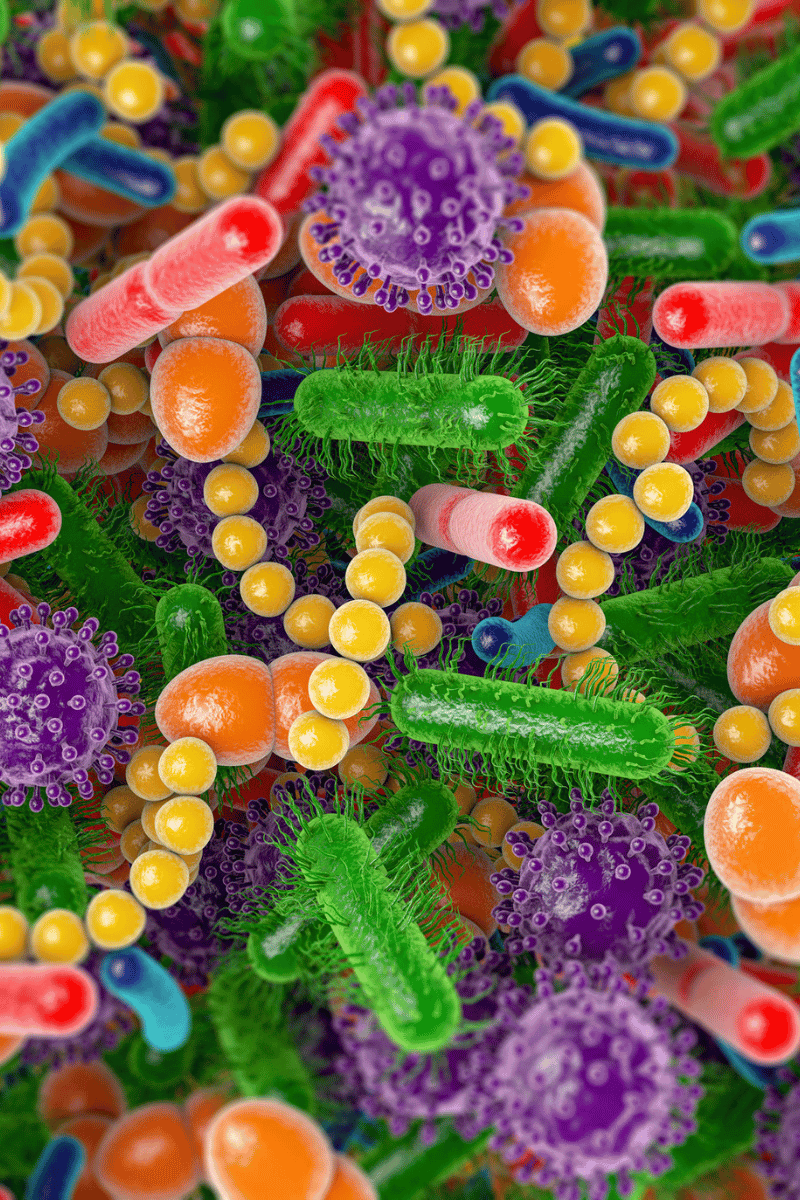
Why is our gut microbiome so important?
Our gut microbiome significantly influences our health. It influences the body’s ability to use and absorb micronutrients from food. It can also impact a person’s risk of developing certain illnesses such as diabetes and autoimmune disease. Without gut microbes, humans would be at risk of developing vitamin and mineral deficiencies and also would lose the benefit of many antioxidants due to the inability to efficiently digest and absorb them.
The gut microbiome has several important functions, such as:
- aiding in digestion
- nutrient absorption
- regulating immune response
- synthesizing vitamins (vitamin B12, vitamin B6, pantothenic acid, niacin, biotin, and folate)
- may influence metabolism and weight regulation. A 2006 study by Turnbaugh and colleagues found that the balance of the two most dominant groups of microbes, Bacteroidetes and Firmicutes, was different in obese subjects than in lean subjects. This resulted in an increased capacity to harvest more calories from the diet, causing weight gain and increased fat deposition.
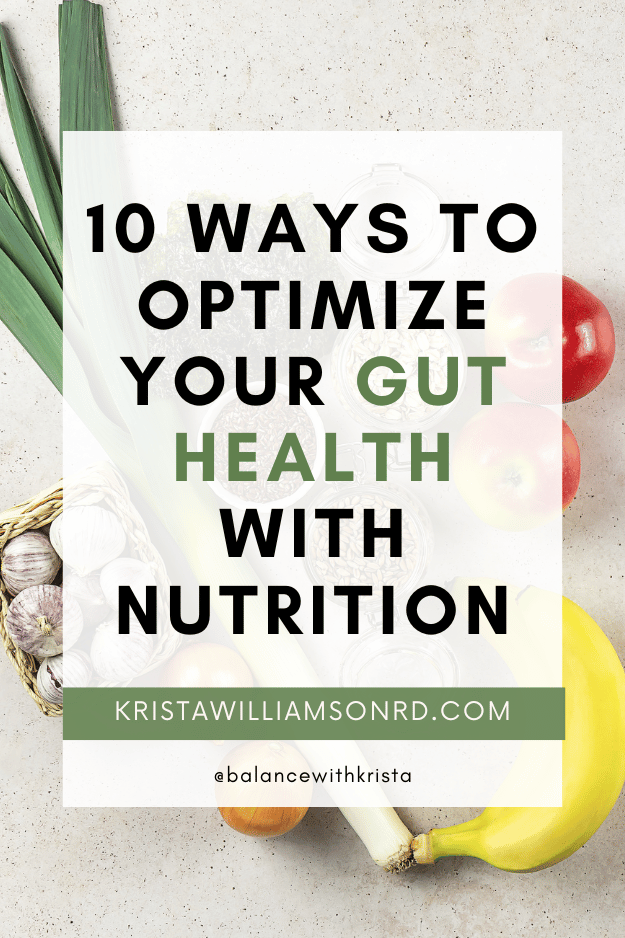
10 Ways to Optimize Your Gut Microbiome through Nutrition
Load Up on Fibre: A diet rich in fibre is essential for a healthy gut. Fibre helps promote regular bowel movements, supports the growth of beneficial gut bacteria, and reduces the risk of digestive issues like constipation and diverticulosis. Aim for natural food sources of fibre, like: fruits, vegetables, whole grains, legumes, nuts, and seeds, instead of fibre-fortified products like “Fibre One” bars.
Aim for fibre-rich foods at every meal: Start your day with a fibre-packed breakfast like overnight oats topped with berries and chia seeds, add a quinoa and veggie salad to your protein at lunch and whip up a pearl barley shrimp and veggie stir-fry at dinner!Embrace Fermented Foods: Fermented foods are rich in beneficial probiotics that can help populate your gut with healthy bacteria. Incorporate fermented foods such as yogurt, kefir, sauerkraut, kimchi, and kombucha into your diet. Enjoy a refreshing snack of Greek yogurt topped with honey and sliced almonds, or add sauerkraut as a flavourful topping to sandwiches or salads.
Limit Ultra-Processed Foods: Ultra-processed foods high in sugar, fats, and artificial additives can negatively impact gut health. Opt for whole, minimally processed foods whenever possible. Think outside of the box/bag at snack time – instead, try sliced veggies with hummus, sliced apples with almond butter, hard-boiled eggs, strawberries with dark chocolate hummus, or avocado toast.
Stay Hydrated: Adequate hydration is essential for maintaining healthy digestion and regular bowel movements. Aim to drink plenty of water throughout the day. Herbal teas and infused water with fruits or cucumber slices are refreshing options to keep you hydrated while supporting your gut health.
Mindful Eating: Slow down and pay attention to your meals. Practice mindful eating by sitting up straight, smelling the food, breathing, chewing your food thoroughly, savouring each bite, and avoiding distractions like phones or screens. This can help improve digestion and nutrient absorption while reducing the risk of overeating.
Diversify Your Diet: Variety is key to a healthy gut microbiome. Include a wide range of foods in your diet to provide diverse nutrients and support the growth of different types of gut bacteria. Experiment with different grains like quinoa, barley, and farro, and incorporate a variety of colourful fruits and vegetables into your meals.
Manage Stress: Chronic stress can disrupt gut health by affecting digestion and increasing inflammation. Incorporate stress-reducing practices like yoga, prayer, meditation, deep breathing exercises, or spending time in nature into your daily routine. Additionally, prioritize adequate sleep, as sleep deprivation acts like stress in your body and can also impact gut health.
Prebiotic Foods: Prebiotics, such as inulin, galactooligosaccharides, fructooligosaccharides, and lactulose have been found to shift the composition of the gut microbiome to encourage the growth of the most beneficial species. They serve as “food” for beneficial gut bacteria.
Include prebiotic-rich foods, such as onions, garlic, chicory root, artichokes, leeks, asparagus, bananas, barley and oats in your diet. For example, a simple snack such as a banana with almond butter or a chicken, barley and veggie salad with a garlic-infused dressing.Limit Artificial Sweeteners: Artificial sweeteners like aspartame, sucralose, and saccharin may disrupt the balance of gut bacteria and contribute to digestive issues in some people, so it’s best to limit overall intake.
Listen to Your Body: Lastly, pay attention to how different foods make you feel. If you’re experiencing any digestive concerns (and even if you’re not), it could be beneficial to keep a food diary to track how certain foods are affecting your digestion and overall well-being. If you notice any patterns of discomfort or symptoms, consider consulting with a Registered Dietitian (click here to work with me) to help you identify potential trigger foods and develop an individualized plan for optimal gut health.
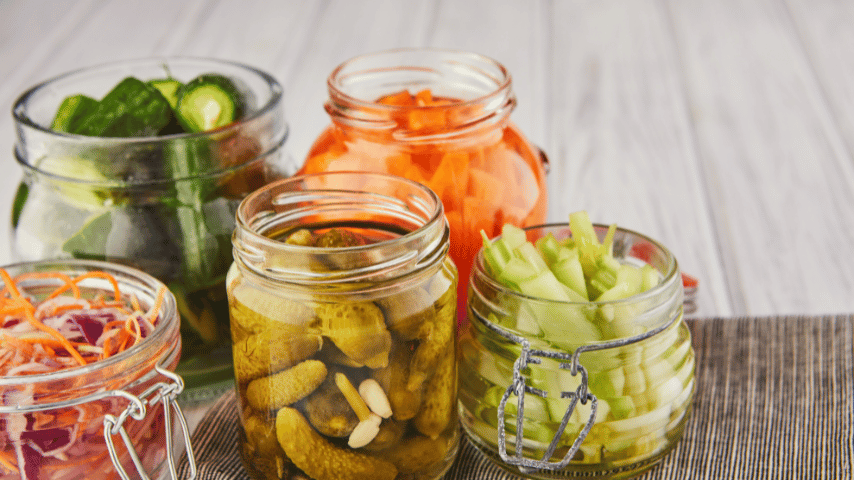
My opinion
As research emerges, it becomes more and more clear that the microbiome has a significant influence on human health, well-being, and nutritional status. By nourishing your gut with a diverse array of nutrient-rich foods, incorporating fermented foods and prebiotics into your diet, managing stress, and adopting healthy lifestyle habits, you can optimize your gut microbiome to support overall wellness.
Diet changes can modify the microbiome’s composition in as little as 24 hours, but long-term dietary patterns seem to determine the general types of microbes found in the gut.
Realistically, you won’t always eat *perfectly*, sleep 8 hours a night, and have zero stress – you’re only human and life will happen – and that’s okay! Remember that even small, consistent changes over time can lead to significant improvements in gut health and overall well-being.
From the list above, what is one thing you could add to your routine tomorrow to help support your gut microbiome?
Tell me in the comments below!
PLEASE NOTE:
I’d love to know if this was helpful to you! If you have any questions, please DM me on Instagram or comment below.
All blog posts are written for general nutrition improvement and should only be used as a guide. This article is intended for educational purposes only and is not designed to diagnose, treat, prevent or cure any condition. It is not specific advice for any individual. Before adding supplements to your regimen, please speak to your healthcare professional.


